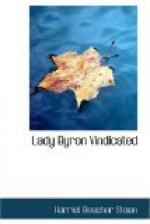This ruin Lady Byron prevented by her utter silence and great self-command. Mrs. Leigh never lost position. Lady Byron never so varied in her manner towards her as to excite the suspicions even of her confidential old servant.
To protect Mrs. Leigh effectually, it must have been necessary to continue to exclude even her own mother from the secret, as we are assured she did at first; for, had she told Lady Milbanke, it is not possible that so high-spirited a woman could have restrained herself from such outward expressions as would at least have awakened suspicion. There was no resource but this absolute silence.
Lady Blessington, in her last conversation with Lord Byron, thus describes the life Lady Byron was leading. She speaks of her as ’wearing away her youth in almost monastic seclusion, questioned by some, appreciated by few, seeking consolation alone in the discharge of her duties, and avoiding all external demonstrations of a grief that her pale cheek and solitary existence alone were vouchers for.’ {49}
The main object of all this silence may be imagined, if we remember that if Lord Byron had not died,—had he truly and deeply repented, and become a thoroughly good man, and returned to England to pursue a course worthy of his powers, there was on record neither word nor deed from his wife to stand in his way.
HIS PLACE WAS KEPT IN SOCIETY, ready for him to return to whenever he came clothed and in his right mind. He might have had the heart and confidence of his daughter unshadowed by a suspicion. He might have won the reverence of the great and good in his own lands and all lands. That hope, which was the strong support, the prayer of the silent wife, it did not please God to fulfil.
Lord Byron died a worn-out man at thirty-six. But the bitter seeds he had sown came up, after his death, in a harvest of thorns over his grave; and there were not wanting hands to use them as instruments of torture on the heart of his widow.
CHAPTER III. RESUME OF THE CONSPIRACY.
We have traced the conspiracy of Lord Byron against his wife up to its latest device. That the reader’s mind may be clear on the points of the process, we shall now briefly recapitulate the documents in the order of time.
I. March 17, 1816.—While negotiations for separation were pending,—’Fare thee well, and if for ever.’
While writing these pages, we have received from England the testimony of one who has seen the original draught of that ‘Fare thee well.’ This original copy had evidently been subjected to the most careful and acute revision. Scarcely two lines that were not interlined, scarcely an adjective that was not exchanged for a better; showing that the noble lord was not so far overcome by grief as to have forgotten his reputation. (Found its way to the public prints through the imprudence of a friend.)




